The Pre-Pregnancy Genetic Testing Market is estimated to be valued at USD 268.8 million in 2025 and is projected to reach USD 450.6 million by 2035, registering a compound annual growth rate (CAGR) of 5.3% over the forecast period.
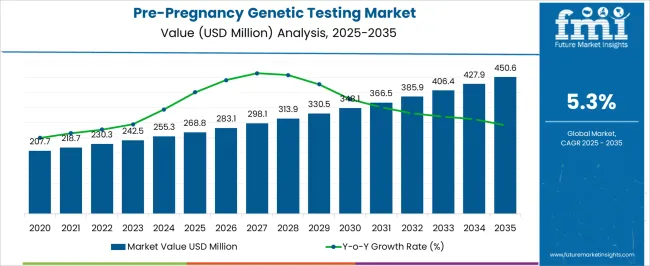
| Metric | Value |
|---|---|
| Pre-Pregnancy Genetic Testing Market Estimated Value in (2025 E) | USD 268.8 million |
| Pre-Pregnancy Genetic Testing Market Forecast Value in (2035 F) | USD 450.6 million |
| Forecast CAGR (2025 to 2035) | 5.3% |
The pre-pregnancy genetic testing market is experiencing significant growth, supported by the rising awareness of genetic disorders and the growing demand for early risk identification in family planning. Couples are increasingly seeking genetic insights before conception to evaluate the probability of inheritable conditions, driven by greater access to advanced diagnostic technologies and improved healthcare infrastructure. The market is being shaped by continuous advancements in genomics, sequencing techniques, and bioinformatics platforms that allow highly accurate results with shorter turnaround times.
Growing emphasis on personalized healthcare, along with supportive government policies and insurance coverage in some regions, is creating a favorable environment for adoption. Demand is further influenced by the increasing prevalence of genetic abnormalities linked to lifestyle factors, advanced maternal age, and environmental exposures.
Healthcare providers are integrating genetic counseling alongside testing services to enhance decision-making, creating comprehensive pre-pregnancy care solutions As awareness expands and testing becomes more accessible, the market is anticipated to grow steadily, driven by innovation, affordability, and the prioritization of preventive healthcare practices.
The pre-pregnancy genetic testing market is segmented by test type, end user, and geographic regions. By test type, pre-pregnancy genetic testing market is divided into Diagnostic Test, Chorionic Villi Sampling (CVS), Transabdominal CVS, Transvaginal CVS, Amniocentesis, Placental Biopsy, Cordocentesis, Fetal Biopsy, Screening Test, Carrier Screening, Sequential Screening, and Maternal Serum Quad Screening. In terms of end user, pre-pregnancy genetic testing market is classified into Hospitals, Clinics, and Diagnostic Centers. Regionally, the pre-pregnancy genetic testing industry is classified into North America, Latin America, Western Europe, Eastern Europe, Balkan & Baltic Countries, Russia & Belarus, Central Asia, East Asia, South Asia & Pacific, and the Middle East & Africa.
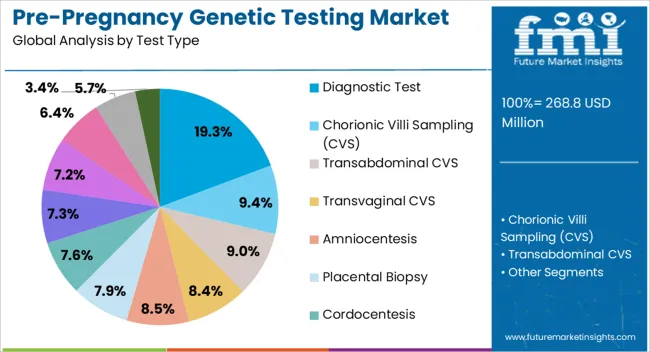
The diagnostic test segment is projected to hold 19.3% of the pre-pregnancy genetic testing market revenue share in 2025, making it a leading test type. Its growth is being driven by the increasing need for precise identification of genetic conditions that may influence reproductive outcomes. Diagnostic tests provide conclusive results that help couples make informed family planning decisions, particularly when there is a known history of genetic disorders.
Rising awareness among individuals about the role of genetic abnormalities in infertility and pregnancy complications is also supporting adoption. Advancements in next-generation sequencing, chromosomal microarray analysis, and polymerase chain reaction-based methods are improving the sensitivity and specificity of diagnostic procedures. Healthcare providers are increasingly recommending diagnostic tests as part of pre-pregnancy evaluations to mitigate risks and ensure informed reproductive choices.
Furthermore, diagnostic testing is being supported by an increasing number of specialized laboratories and hospital-based genetic programs that emphasize early detection As genetic literacy improves and testing technologies become more accessible, diagnostic testing is expected to maintain a crucial role in shaping pre-pregnancy healthcare strategies.
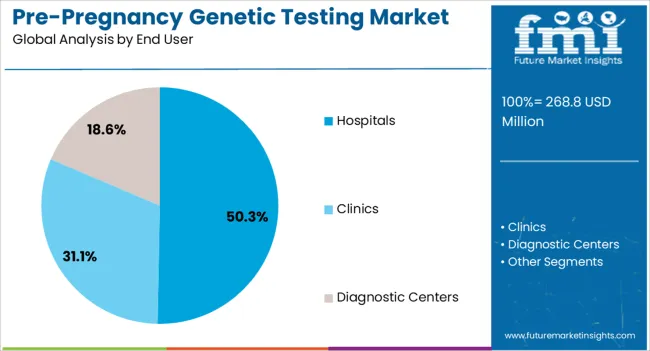
The hospitals segment is anticipated to represent 50.3% of the pre-pregnancy genetic testing market revenue share in 2025, positioning it as the leading end user. Hospitals are being preferred due to their comprehensive infrastructure, access to advanced diagnostic facilities, and availability of genetic counseling services under one roof. Patients trust hospitals for genetic testing as these institutions provide reliable clinical environments and multidisciplinary expertise to interpret and act upon test results.
The rising demand for integrated care that combines testing with reproductive counseling is encouraging couples to choose hospital-based services. Hospitals are also expanding their collaborations with diagnostic laboratories and research institutions, enhancing the quality and accessibility of pre-pregnancy genetic testing. Government-supported healthcare initiatives and insurance coverage in select regions are further strengthening the hospital segment’s role.
With the rising prevalence of genetic conditions, hospitals are investing in advanced genomic platforms and training programs for clinicians to support early detection and intervention As awareness of preventive genetic care grows, hospitals are expected to remain the dominant channel for delivering pre-pregnancy genetic testing services globally.
Pre-pregnancy genetic testing helps in identifying a problem of an unborn child before or during pregnancy. Pre-pregnancy genetic test is done to know the birth defects which are associated with genetic disorder or syndromes.
Possibility of having a genetic disorder or birth defect could be due to the family or parents history of genetic disorder.
Some birth defects like Down syndrome, Trisomy 13 and Trisomy 18, are chromosome abnormalities that a child gets by having an extra chromosome in the sperm or egg. People with Down syndrome are prone to cardiac disorder or mild mental retardation.
Babies with trisomy 13 and 18 have the same effects as Down syndrome and majority of them do not survive after 1 year of age. Spina bifida, which is a neural tube defect, happens when a baby's spinal cord not fully developed and close into a tube.
The chances are higher to have spina bifida if someone has a family history of the same. People suffering from it have partial paralysis, mental retardation or bladder issues.
Increasing awareness and preference for pre-pregnancy genetic testing, increase number of chromosomal abnormalities cases, increase spending per capita income, changing lifestyle, are key driving factor for this market.
Furthermore, rising consumer awareness, rising demand of non-invasive pre-natal treatment, technology advancement and innovation, increasing healthcare expenditure, are some other key driving factors in pre-pregnancy genetic testing market.
High accuracy and safety has led to increase in demand of pre-pregnancy genetic testing in developed and developing regions.
With so many advantages and splendid features of pre-pregnancy genetic testing, it has few disadvantages too. High cost of the test is acting as a barrier for pre-pregnancy genetic market.
The pre-pregnancy genetic testing market has grown substantially at a healthy CAGR due to growing high incidence rate of chromosomal abnormalities and increase popularity of pre-pregnancy genetic testing procedures.
With rapid technological advancement and innovation, pre-pregnancy genetic testing market is expected to grow globally. North America is the largest market for pre-pregnancy genetic testing and Asia Pacific would be the fastest growing market in the forecast period.
The pre-pregnancy genetic testing market is expected to register a double-digit CAGR over the forecast period. Depending on geographic regions, pre-pregnancy genetic testing market is segmented into seven key regions: North America, Latin America, Eastern Europe, Western Europe, and Asia Pacific excluding Japan (APEJ), Japan, and Middle East & Africa (MEA).
North America is the largest market for pre-pregnancy genetic testing and is expected to dominate the market throughout the forecast period. Asia Pacific is the fastest growing region in the forecast period.
The report is a compilation of first-hand information, qualitative and quantitative assessment by industry analysts, inputs from industry experts and industry participants across the value chain. The report provides in-depth analysis of parent market trends, macro-economic indicators and governing factors along with market attractiveness as per segments. The report also maps the qualitative impact of various market factors on market segments and geographies.
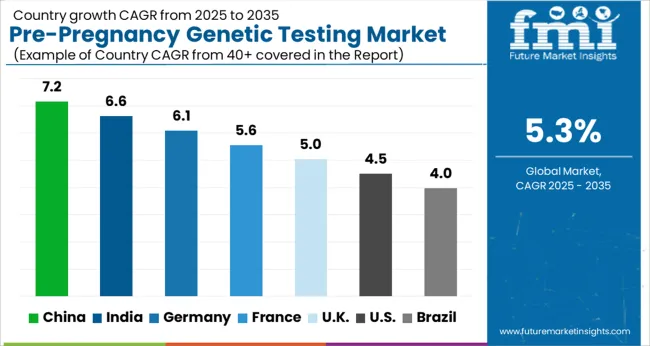
| Country | CAGR |
|---|---|
| China | 7.2% |
| India | 6.6% |
| Germany | 6.1% |
| France | 5.6% |
| UK | 5.0% |
| USA | 4.5% |
| Brazil | 4.0% |
The Pre-Pregnancy Genetic Testing Market is expected to register a CAGR of 5.3% during the forecast period, exhibiting varied country level momentum. China leads with the highest CAGR of 7.2%, followed by India at 6.6%. Developed markets such as Germany, France, and the UK continue to expand steadily, while the USA is likely to grow at consistent rates. Brazil posts the lowest CAGR at 4.0%, yet still underscores a broadly positive trajectory for the global Pre-Pregnancy Genetic Testing Market. In 2024, Germany held a dominant revenue in the Western Europe market and is expected to grow with a CAGR of 6.1%. The USA Pre-Pregnancy Genetic Testing Market is estimated to be valued at USD 92.8 million in 2025 and is anticipated to reach a valuation of USD 144.2 million by 2035. Sales are projected to rise at a CAGR of 4.5% over the forecast period between 2025 and 2035. While Japan and South Korea markets are estimated to be valued at USD 13.4 million and USD 7.0 million respectively in 2025.
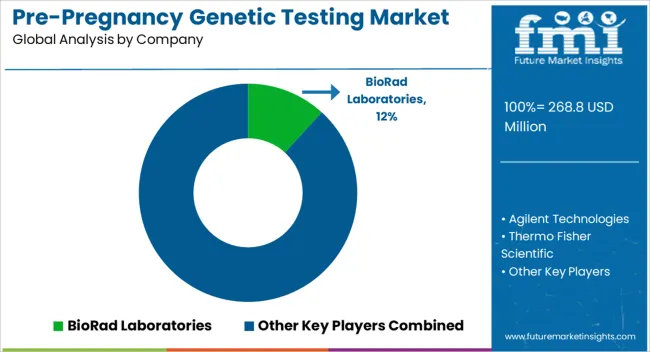
| Item | Value |
|---|---|
| Quantitative Units | USD 268.8 Million |
| Test Type | Diagnostic Test, Chorionic Villi Sampling (CVS), Transabdominal CVS, Transvaginal CVS, Amniocentesis, Placental Biopsy, Cordocentesis, Fetal Biopsy, Screening Test, Carrier Screening, Sequential Screening, and Maternal Serum Quad Screening |
| End User | Hospitals, Clinics, and Diagnostic Centers |
| Regions Covered | North America, Europe, Asia-Pacific, Latin America, Middle East & Africa |
| Country Covered | United States, Canada, Germany, France, United Kingdom, China, Japan, India, Brazil, South Africa |
| Key Companies Profiled | BioRad Laboratories, Agilent Technologies, Thermo Fisher Scientific, PerkinElmer, Natera, Pacific Biosciences of California, F. HoffmannLa Roche, Qiagen, Berry Genomics, Illumina, Eurofins Scientific, LabCorp, Oxford Nanopore Technologies, Myriad Genetics, and Quest Diagnostics |
The global pre-pregnancy genetic testing market is estimated to be valued at USD 268.8 million in 2025.
The market size for the pre-pregnancy genetic testing market is projected to reach USD 450.6 million by 2035.
The pre-pregnancy genetic testing market is expected to grow at a 5.3% CAGR between 2025 and 2035.
The key product types in pre-pregnancy genetic testing market are diagnostic test, chorionic villi sampling (cvs), transabdominal cvs, transvaginal cvs, amniocentesis, placental biopsy, cordocentesis, fetal biopsy, screening test, carrier screening, sequential screening and maternal serum quad screening.
In terms of end user, hospitals segment to command 50.3% share in the pre-pregnancy genetic testing market in 2025.






Our Research Products

The "Full Research Suite" delivers actionable market intel, deep dives on markets or technologies, so clients act faster, cut risk, and unlock growth.

The Leaderboard benchmarks and ranks top vendors, classifying them as Established Leaders, Leading Challengers, or Disruptors & Challengers.

Locates where complements amplify value and substitutes erode it, forecasting net impact by horizon

We deliver granular, decision-grade intel: market sizing, 5-year forecasts, pricing, adoption, usage, revenue, and operational KPIs—plus competitor tracking, regulation, and value chains—across 60 countries broadly.

Spot the shifts before they hit your P&L. We track inflection points, adoption curves, pricing moves, and ecosystem plays to show where demand is heading, why it is changing, and what to do next across high-growth markets and disruptive tech

Real-time reads of user behavior. We track shifting priorities, perceptions of today’s and next-gen services, and provider experience, then pace how fast tech moves from trial to adoption, blending buyer, consumer, and channel inputs with social signals (#WhySwitch, #UX).

Partner with our analyst team to build a custom report designed around your business priorities. From analysing market trends to assessing competitors or crafting bespoke datasets, we tailor insights to your needs.
Supplier Intelligence
Discovery & Profiling
Capacity & Footprint
Performance & Risk
Compliance & Governance
Commercial Readiness
Who Supplies Whom
Scorecards & Shortlists
Playbooks & Docs
Category Intelligence
Definition & Scope
Demand & Use Cases
Cost Drivers
Market Structure
Supply Chain Map
Trade & Policy
Operating Norms
Deliverables
Buyer Intelligence
Account Basics
Spend & Scope
Procurement Model
Vendor Requirements
Terms & Policies
Entry Strategy
Pain Points & Triggers
Outputs
Pricing Analysis
Benchmarks
Trends
Should-Cost
Indexation
Landed Cost
Commercial Terms
Deliverables
Brand Analysis
Positioning & Value Prop
Share & Presence
Customer Evidence
Go-to-Market
Digital & Reputation
Compliance & Trust
KPIs & Gaps
Outputs
Full Research Suite comprises of:
Market outlook & trends analysis
Interviews & case studies
Strategic recommendations
Vendor profiles & capabilities analysis
5-year forecasts
8 regions and 60+ country-level data splits
Market segment data splits
12 months of continuous data updates
DELIVERED AS:
PDF EXCEL ONLINE
Genetic Leukemia Detection Testing Market
Point-Of-Care Genetic Testing Market
Cancer-focused Genetic Testing Service Market Analysis – Growth & Industry Insights 2024-2034
Preimplantation Genetic Testing Market Size and Share Forecast Outlook 2025 to 2035
Direct-to-Consumer Genetic Testing Market Analysis - Trends & Outlook 2025 to 2035
Genetic Analyzers Market Size and Share Forecast Outlook 2025 to 2035
Testing, Inspection & Certification Market Growth – Trends & Forecast 2025 to 2035
Genetically Modified Food Market Analysis by Type, Trait, and Region through 2035
Genetic Cardiomyopathies Market
5G Testing Market Size and Share Forecast Outlook 2025 to 2035
AB Testing Software Market Size and Share Forecast Outlook 2025 to 2035
5G Testing Equipment Market Analysis - Size, Growth, and Forecast 2025 to 2035
Eye Testing Equipment Market Size and Share Forecast Outlook 2025 to 2035
HSV Testing Market Size and Share Forecast Outlook 2025 to 2035
IoT Testing Equipment Market Size and Share Forecast Outlook 2025 to 2035
HPV Testing and Pap Test Market Size and Share Forecast Outlook 2025 to 2035
Cytogenetic Systems Market Size and Share Forecast Outlook 2025 to 2035
GMO Testing Services Market Insights – Food Safety & Regulatory Compliance 2024 to 2034
GMP Testing Services Market
LTE Testing Equipment Market Growth – Trends & Forecast 2019-2027

Thank you!
You will receive an email from our Business Development Manager. Please be sure to check your SPAM/JUNK folder too.
Chat With
MaRIA